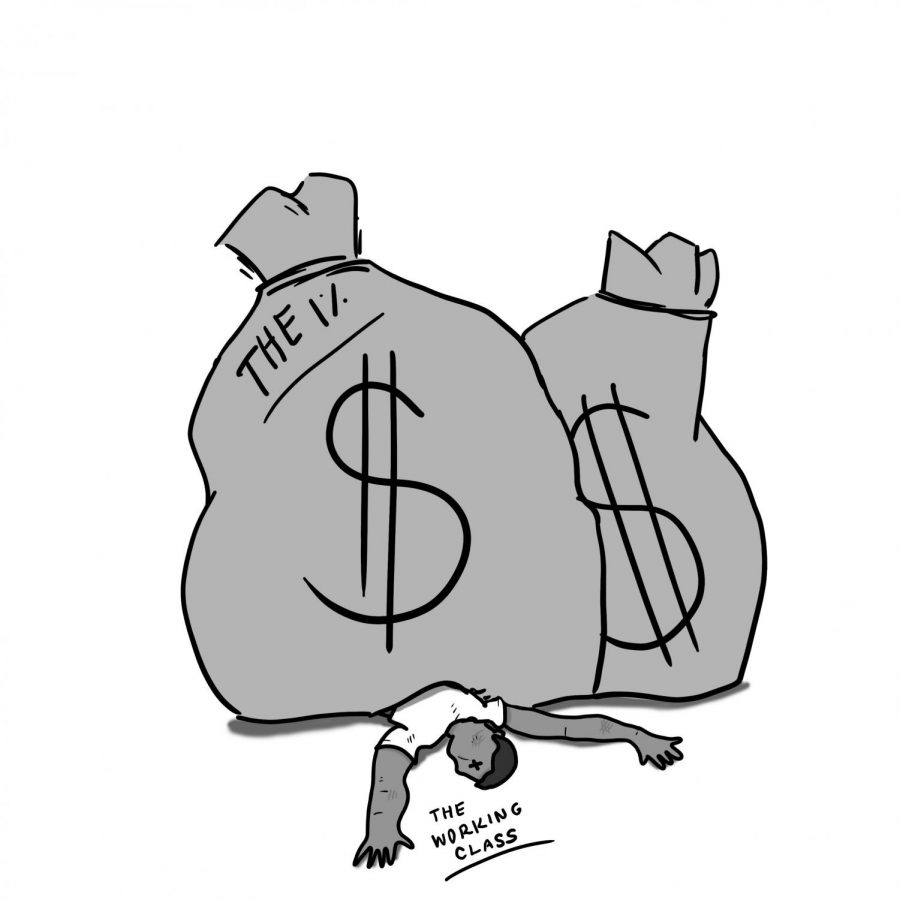America is no stranger to wealth disparity. In recent years, the gap between the rich and the poor has escalated to levels similar to those seen before the Great Depression. Wealth is increasingly being concentrated into the hands of a few. In 2016, the top 1% owned nearly 40% of wealth, while the bottom 90% owned just 21%.
Consolidated wealth tends to gets sat on, serving to produce even more wealth rather than recycling it back into the economy. Although GDP is still increasing, the wealthiest Americans are reaping most of the benefits while lower- and middle-class citizens continue to struggle.
It’s the result of many contributing factors including stagnating wages, declining union power, advancements in technology, outsourcing labor, globalization and the tax code, all with an emphasis on satisfying shareholders.
Extreme wealth inequality hurts everyone, even the rich. When wages rise at a rate lower than the rate of inflation, the purchasing power of the consumer diminishes. This leads to fewer goods and services being bought which harms businesses.
But most importantly, it gives the wealthy power over policy decisions by paying off politicians through lobbying. This is damaging to democracy.
The response to wealth inequality could result in economic turmoil possibly due to an economic crash or a political uprising.
We can already see the growing frustration with the droves of voters from the working class that elected President Donald Trump who promised job creation and protection from “thieving” immigrants. On the left, there is a strong demand for socialist government programs including universal healthcare and affordable higher education.
Throughout the country there seems to a consensus that America’s growing GDP doesn’t fully reflect the full picture of its economic conditions, yet there is no agreement as to how to improve economic prospects for all Americans.
Addressing this issue is at the forefront of the 2020 presidential election and candidates have shared an array of potential solutions.
Most candidates support raising the minimum wage to $15 and reversing President Trump’s tax reforms, but some candidates have more aggressive proposals.
Sen. Cory Booker seeks to create $1,000 opportunity bonds to all newborns in the U.S. Entrepreneur Andrew Yang hopes to establish a universal basic income system. Sen. Bernie Sanders wants to guarantee federal jobs. Sen. Elizabeth Warren suggests an Ultra-Millionaire Tax on the top 1%.
Significant tax reforms would need to be made for any of these proposals become policy which would face major push back from conservatives arguing the usual arguments. The response tends to be rooted in the idea of taxation as theft, with trust in the concept of trickle-down economics.
Taxation is not theft. Rather, it’s the dues we owe the government which functions as the protector of private property. It is part of the social contract.
On paper, trickle-down economics seems to be relatively straight forward, but the evidence shows this is not a sufficient method. Nearly all of the money saved from Trump’s tax breaks to big corporations went into the hands of shareholders rather than creating new jobs or raising wages. In fact, the 1,000 largest public companies who reaped the benefits tax breaks actually cut back thousands of jobs.
Reform is long overdue.
The top 10% should be taxed on their total wealth which would include assets and capital gains. The rate should be high enough to slow down the speed at which their wealth grows which tends to grow at a higher rate than the bottom 90% since most of their assets are tied up in capital investments.
Large corporations— like Amazon that rakes in billions of dollars in profit yet paid no federal taxes last year — don’t need to receive such enormous tax credits, reductions and refunds. The tax code must change to prevent big corporations from finding loopholes that get them out of millions of dollars in taxes. A portion of the mass amounts of money these companies generate needs to be recycled back into the economy for public use.
The revenue from these tax reforms could be used for so many other purposes that would bring prosperity to the whole country. It could be used towards infrastructure, affordable housing options, the public education system, veterans care, the opioid crisis, climate change or reducing unemployment.
The economy is bound to lapse if it continues to be rigged in favor of the wealthy and the demand for reform is intensifying. Our government has an obligation to look after the interests of the worker. As the race for presidency ramps up over the next few months with anticipation of primary season, fully consider what candidates are offering to resolve the issue of wealth inequality because we need a solution soon — not in another four years.
Catherine Van Weele is a sophomore studying political science and economics. Follow her on Twitter @catievanweele.








